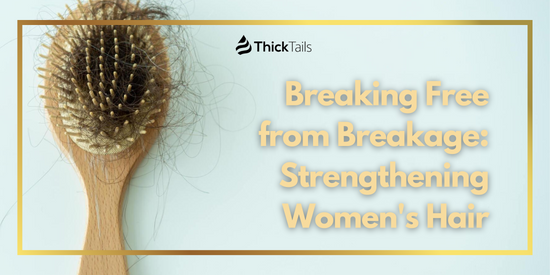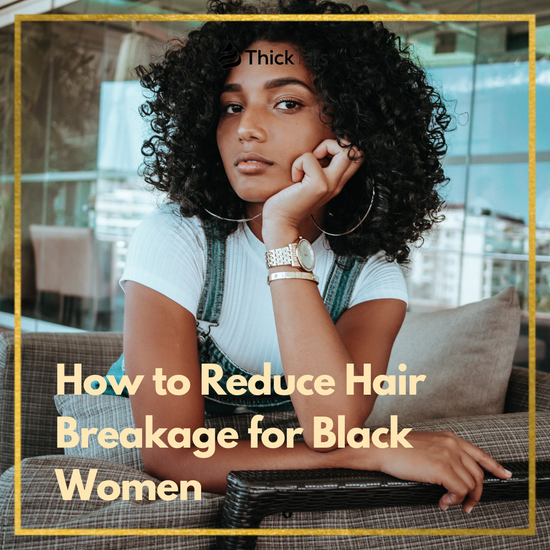For many, hair care goes beyond just lathering up with a random shampoo or following a trendy styling routine. It's personal, practical, and often a significant part of self-image. But when your locks start to lose luster, when brittle strands become your reality, it's a sign that it's time to understand the underlying issues, especially when it comes to dryness. This is particularly key for most women, who might notice a direct impact on their self-esteem when hair begins to break or fall out.
The Science Behind Dry Hair

Dry hair is a common plight among women, leading to frustration and concerns over hair loss and diminished hair health. The condition stems from a lack of moisture and natural oils in the hair, leaving the strands brittle and prone to breaking. Women experiencing dry hair might notice an increase in hair fall, which can significantly affect their confidence and self-perception. Recognizing and addressing the causes of dryness is crucial in preventing hair loss and maintaining the overall vitality of one's hair.
Causes of Dry Hair: Environmental, Lifestyle, and Genetic Factors
The culprits behind dry hair are a mix of nature and nurture. Environmental factors like sun exposure and humidity changes can sap moisture from strands. Lifestyle habits such as over-processing with heated styling tools or excessive washing can escalate the issue. And, for some, genetic factors predispose them to produce less natural oil, contributing to ongoing dryness.
Effects of Dryness on Hair Structure: How It Leads to Breakage
Hair, at its core, is a complex protein filament. Key to its health is the natural oil, sebum, produced by our scalp. This oil helps to keep our hair flexible and lubricated. When hair is lacking in moisture, it becomes stiff and more prone to breakage, as essential nutrients and oils are lost, leaving hair weak and fragile.
Identifying Dry Hair: Symptoms and Signs
How do you know if your hair is actually dry or you're simply neglecting it? Symptoms include a lack of natural shine, rough texture, and a tendency to tangle. More severe cases involve split ends and significant hair breakage, especially noticeable during grooming or washing.
For women combating dry hair, understanding its impact on hair loss is pivotal. Prolonged dryness not only exacerbates hair fall but can also deter new hair growth, disrupting the natural regrowth cycle. Addressing dry hair promptly can mitigate hair loss, ensuring women maintain their hair's health and vitality.
Preventing and Treating Dry Hair for Stronger, Healthier Hair
Preventing and treating dry hair, especially in women, is vital to tackle problems related to hair loss and overall hair health deterioration. A holistic approach involving gentle cleansing, the judicious use of hydrating products, and minimizing heat styling can make a significant difference in managing dry hair. It's important for women to incorporate hair care routines that restore moisture and protect the scalp's natural oils, reducing the risk of hair loss and promoting the regeneration of healthy, resilient strands. Understanding the unique needs of your hair type and seeking professional advice when necessary can also be instrumental in combatting the challenges of dry hair.
Hydration and Moisture: Essential Tips for Keeping Hair Hydrated
Staying hydrated doesn't just benefit your body; it's just as crucial for maintaining healthy hair. Tips include drinking plenty of water, using a humidifier to keep the air moist, and using protective headwear when exposed to extreme weather conditions.
Hair Care Products for Dry Hair: Shampoos, Conditioners, and Treatments
The market is awash with products designed to combat dryness, but looking for ingredients like shea butter, argan oil, and glycerin can help. These moisturize and seal the hair cuticle, trapping in hydration and preventing further damage. Regular use of deep conditioning treatments or hair masks also provides an intensive moisture boost.
For women battling dry hair and hair loss, it's pivotal to choose shampoos and conditioners formulated for intense hydration, aiming to minimize damage and promote recovery. Incorporating hair supplements rich in vitamins and minerals can further enhance hair health from the inside out, supporting follicle strength and growth. Additionally, applying a nourishing hair serum regularly can form a protective barrier, locking in moisture and leaving strands silky and manageable.
Natural Remedies for Dry Hair: DIY Masks and Oils for Nourishment
For those wishing to take a more natural route, kitchen staples like honey, avocado, and coconut oil can be made into effective hair masks. These not only hydrate but can also provide nutrients that the hair is missing. Regular scalp massages with natural oils can also help distribute sebum more evenly.
For women dealing with dry hair, integrating a comprehensive routine that spans the right shampoo and conditioner, hair supplements, and hair serum can create a formidable defense against hair loss. These products work in tandem to replenish moisture, strengthen hair from root to tip, and encourage a healthy growth cycle. By addressing dry hair with this holistic approach, women can significantly reduce hair loss and improve their hair's overall health and appearance.
Lifestyle Changes for Managing Dry Hair and Preventing Breakage

For women battling dry hair, understanding and addressing this issue is crucial to prevent excessive hair loss and maintain hair health. Integrating a targeted hair care regimen, which includes a hydrating shampoo and conditioner specifically designed for dry hair, can significantly mitigate damage. Additionally, incorporating hair supplements rich in essential nutrients and vitamins, alongside the application of nourishing hair serums, provides an extra layer of protection and revitalization. This dual approach ensures not only the surface-level treatment of dryness but also addresses the internal factors contributing to hair health, aiming for a comprehensive solution to the challenges faced by women experiencing dry hair and hair loss.
Dietary Adjustments: Foods That Promote Hair Hydration
Including omega-3 and omega-6 fatty acids, as well as vitamins A, C, and E, in your diet can significantly impact your hair health. Foods such as salmon, flaxseeds, and nuts can help nourish from the inside, contributing to the shine and strength of your hair.
Hair Care Habits: Dos and Don'ts for Dry Hair
Simple daily practices like using a wide-tooth comb on wet hair, avoiding excessive heat, and opting for soft, hair-friendly materials like silk can make a difference in preventing damage. Balancing your washing routine and using sulfate-free shampoos also maintain the hair's natural oils and pH balance.
Professional Treatments: Salon Procedures for Restoring Moisture
When home care isn't enough, professional treatments at salons can be a game-changer. These can range from hot oil massages that penetrate deep into the hair's layers to keratin treatments that seal the cuticle, providing a protective barrier and enhancing the hair's natural sheen.
Mastering the battle against dry hair is about understanding the cause and customizing a routine that suits you. Whether it's through product solutions, natural remedies, or dietary changes, the goal is to achieve hair that shines with health and vitality, not one that breaks under life's stresses.







